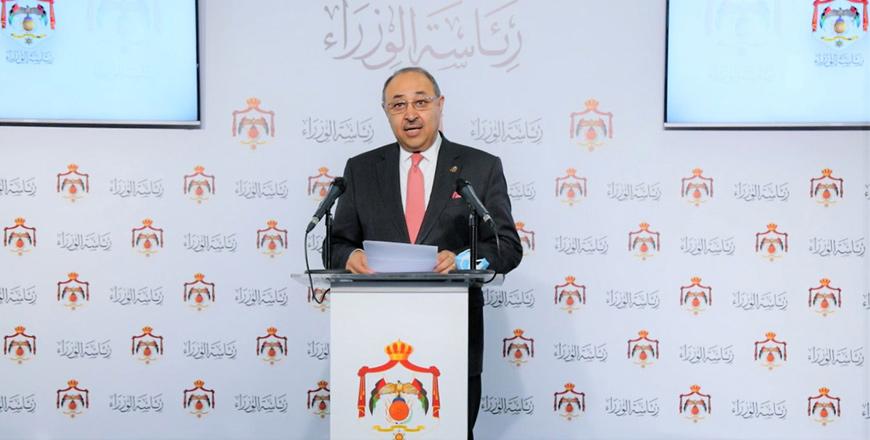- Local News
- Thu-2021-05-27 | 01:55 pm

Nayrouz News Agency :
The government on Wednesday announced several procedures aiming for a return to normalcy through the gradual reopening of closed sectors based on the epidemiological situation in the Kingdom.
During a press briefing at the Prime Ministry, Minister of State for Media Affairs Sakher Dudin said that the first phase of the gradual reopening starts on June 1, noting that all procedures are subject to change depending on the epidemiological condition.
Dudin, who is also the government spokesperson, said that this phase includes the gradual reopening of some sectors and activities in addition to putting in place procedures to regulate the entry of arrivals from abroad.
The minister added that the second phase starts on July 1 and includes decreasing the hours of curfew to 12 midnight for businesses and 1am for the public, and applying procedures stimulating tourism, mainly in Aqaba, Petra, Wadi Rum and Disi tourist camps.
He added that the third phase starts on September 1, during which most aspects of normal life will be resumed, all forms of curfew will be cancelled, in-class education at schools and universities will be resumed and most sectors will be allowed to work in full capacity at all times.
Dudin said that the plan of reaching a safe summer will include issuing defence orders necessary to implement the plan’s procedures.
Also speaking at the press briefing, Health Minister Feras Al Hawari said that Jordan has signed contracts to secure more than 11.5 million doses of various kinds of COVID-19 vaccines, noting that the ministry seeks to inoculate 100,000 people daily and vaccinate 85,000 teachers to resume in-class education.
Hawari pointed out that the ministry succeeded in vaccinating 13 per cent of the targeted segment of the populations, adding that the target is to reach 30 per cent.
He also said that field hospitals are all ready to receive COVID-19 patients with their total capacity of some 1,100 beds, noting that the ministry is still on alert to face any new wave of the pandemic.
The minister said that there are three indicators for the improvement of the epidemiological situation: The way the virus spreads, the percentage of positive tests and the occupancy rates at hospitals. The health minister noted that the epidemiological situation in the Kingdom has "remarkably improved” over the past two weeks.
Minister of Industry, Trade and Supply Maha Al Ali said that coffee shops will resume serving shisha in their external yards as of June 15 on the condition that at least 21 days have elapsed since both coffee shop staff and visitors have received their of COVID vaccine.
Ali noted that the first phase will see the reopening of sports academies and centres, sports clubs, educational and cultural clubs, cinemas, billiards and snooker clubs, entertainment parks and children’s playgrounds and videogames centres.
Interior Minister Mazen Faraya said that professional associations, societies and unions can hold their elections as of August 1, starting from those with the fewest number of members.
Faraya added that the gradual reopening will be accompanied by strict oversight measures for individuals and institutions, noting that visitors of the Kingdom will be asked to register at the Visit Jordan platform to upload their tests and vaccination certificates and be issued QR codes for inspection purposes through the Sanad application.









